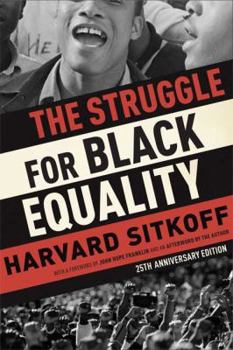The Struggle for Black Equality, 1954-1992 (American Century Series)
Select Format
Select Condition 
Book Overview
The Struggle for Black Equality is a dramatic, memorable history of the civil rights movement. Harvard Sitkoff offers both a brilliant interpretation of the personalities and dynamics of civil rights organizations and a compelling analysis of the continuing problems plaguing many African Americans. With a new foreword and afterword, and an up-to-date bibliography, this anniversary edition highlights the continuing significance of the movement for black equality and justice.
Format:Paperback
Language:English
ISBN:0809089246
ISBN13:9780809089246
Release Date:September 2008
Publisher:Hill & Wang
Length:304 Pages
Weight:0.65 lbs.
Dimensions:1.0" x 5.7" x 8.4"
Customer Reviews
5 ratings
A very good book of American race relations
Published by Thriftbooks.com User , 14 years ago
I am an Australian, who is in the USA for 3 years due to work committments. I wanted to know about the history of race relations in the USA. What I learnt fromt the book amazed me. A must read for all the countries which have racial problems. Sitkoff has presented a lot of hard data in an very readeable book, which is a great achievement.
The Struggle...
Published by Thriftbooks.com User , 14 years ago
Used in a history of the civil rights movement course, this book provides a solid introduction for students to the names, places and dates of many of the movements key moments. The book is easy to read organized into chapters chronologically surrounding key events including the bus boycott, student sit ins, and freedom riders. Sitkoff writing includes enough context to allow the reader understand the movement from it earliest beginnings.
A must read.
Published by Thriftbooks.com User , 22 years ago
The Struggle for Black Equality is an essential book for those (and they should be numerous) interested in the civil rights struggle in the U.S. It provides a necessary background in this field, together with the depth and style both the authors are capable of. Thematically as well as chronolically organized, this book can be useful for "beginners" in the field of American Black History, as well as for more advanced students in search of a good reference book.
A good basic intro to the civil rights movement
Published by Thriftbooks.com User , 23 years ago
I had to read this book for my History 401 class, a week long seminar recently completed. I was not particularly staggered by anything in it but it was pretty solidSome of the more interesting things about this book include its portrayal of Martin Luther King and the evolution of his thinking. After the civil rights laws of 1964-65, King began to turn more and more towards criticising American capitalism and imperialism in Vietnam (of which he was one of the very first to speak out against). The commercially acceptable version of course is his warm and fuzzy "I have a dream" speech of the march on Washington which was orginally initially to be a mass sit-in at congress, the white house lawn and other government buildings with an emphasis on demanding economic rights but was pressured by the Kennedy administration into being very watered down. The civil rights period was basically one where tens of thousands of blacks (and whites) risked mental and physical torture and even death to try to dismantle a fascist police state in the South and to try to badger the federal government to enforce its own basic laws on behalf of blacks. But if blacks now increasingly had the glorious right to vote, if they had more opportunities to advance in white capitalist society, they still had no infrastructure in their communities, were still at the mercy of white landlords, police and businesses which overcharged them as consumers and paid them starvation wages as laborers. The ideas of "Black Power" from Malcolm X to the Black Panthers tried to deal with these problems. Since then some things have got better and some things have got worse. I think the authors somewhat exagerates the "white backlash", even at the time of this books appearance after the LA riots of 92'--it exists among whites to a perhaps signifigant extent but I think that he confuses the rightward shift among political elites and the media with the beliefs of the general population. If anything characterises the political beliefs of the white populations it is apathy e.g. in the 1994 congressional elections about thirty eight percent of those eligible to vote turned out and around nineteen percent of those voted republican. When the Gingrich revolutionaries took office polls showed that relatively few Americans had ever heard of the Contract with America. Polls show substantial support for social democratic measures amongst the general population of this country, despite all the campaigns against "welfare queens" and so on. The author could have said something about Cointelpro and I probably would have given more or less emphasis to some things than he did.
An excellent, un-biased telling of the black struggle
Published by Thriftbooks.com User , 26 years ago
When I saw this book on a list of book choices for U.S. History AP, I thought it would be a one-sided view and not expresses the beliefs of all races, specifically blacks. However, it was extremely detailed and went through every phase of the struggle. The text was not filled with statistics, as books often are about this topic. Specific incidents weren't in any way 'sugar-coated' and it was clear that the black struggle has been worse than the media and even our presidents have ever admitted. The last chapter, and the most current, proves that few strides have been taken to improve the lives of blacks. We see that times are getting better, but not for all people. Harvard Sitkoff has composed an excellent book that can open the eyes of anyone. A must-read for all!






